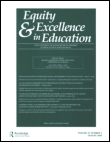
Equity & Excellence in Education
Scope & Guideline
Elevating voices and ideas for equitable education.
Introduction
Aims and Scopes
- Social Justice in Education:
The journal emphasizes research that investigates the intersections of race, class, gender, sexuality, and ability in educational contexts, aiming to highlight and address systemic injustices. - Critical Pedagogies:
It promotes critical pedagogical approaches that empower marginalized voices and foster resistance against oppressive educational practices. - Community Engagement:
The journal explores the role of community in education, focusing on collaborative practices between educators, families, and communities to enhance educational equity. - Diversity and Inclusion:
Research on culturally sustaining pedagogies, inclusive practices, and the representation of diverse identities in educational curricula is a core focus. - Abolitionist Education:
It encourages discussions around abolitionist pedagogies and practices that seek to dismantle oppressive structures within educational systems. - Innovative Educational Practices:
The journal showcases innovative teaching methods and curricular designs that aim to promote equity and excellence in education.
Trending and Emerging
- Racial and Social Justice Activism:
There is an increasing focus on the role of educators and educational institutions in social justice activism, particularly in response to racial injustices and systemic inequalities. - Intersectionality in Education:
Emerging research highlights the importance of intersectional analyses that consider how various identities (race, gender, sexuality, etc.) intersect to impact educational experiences and outcomes. - Community-Centered Educational Practices:
Recent themes emphasize the necessity of community engagement and collaboration, particularly in supporting marginalized families and students. - Disability Justice in Education:
There is a growing emphasis on disability justice, advocating for inclusive practices that recognize the rights and needs of students with disabilities within broader equity frameworks. - Culturally Sustaining Pedagogies:
The journal increasingly features research on culturally sustaining pedagogies that seek to honor and integrate students' cultural backgrounds into the learning process. - Abolitionist Pedagogies:
Emerging discussions around abolitionist pedagogies reflect a desire to reimagine education free from oppressive structures, fostering a critical examination of existing educational practices.
Declining or Waning
- Traditional Approaches to Teacher Education:
There is a noticeable decline in publications centered on conventional teacher education methods, suggesting a shift towards more progressive and justice-oriented pedagogies. - Standardized Testing and Accountability:
Research focused on standardized testing and traditional accountability measures has decreased, as the journal increasingly prioritizes discussions on holistic and equitable assessment practices. - General Educational Policy Analysis:
While educational policy remains relevant, the journal appears to be moving away from generic policy analysis towards more specific critiques of policies that impact marginalized communities. - Focus on Individual Teacher Practices:
Research that solely examines individual teacher practices without a critical lens on systemic issues is less frequently published, indicating a preference for collective and community-based approaches.
Similar Journals

Journal for Multicultural Education
Navigating the complexities of multicultural education.Welcome to the Journal for Multicultural Education, an esteemed publication by Emerald Group Publishing Ltd, dedicated to advancing knowledge and practice in the dynamic fields of Cultural Studies, Education, and Linguistics. Since its inception in 2014, this journal has established itself as a leading forum for research, reflection, and discourse, addressing the multifaceted experiences of diverse cultures in educational contexts. With a commendable Scopus Rank placing it in the 87th percentile for Cultural Studies, the journal is positioned in the Q1 quartile, making it a premier outlet for scholars and practitioners looking to contribute to and engage with cutting-edge research. Our commitment to fostering an inclusive dialogue on multicultural education equips our readers with innovative strategies and insights essential for navigating today’s globalized society. While the journal operates under standard access provisions, we invite researchers, educators, and students alike to explore the rich tapestry of scholarly works published within these pages, and partake in a vibrant community dedicated to transformative education.
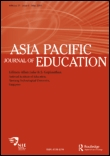
Asia Pacific Journal of Education
Innovating teaching practices with insights from the Asia Pacific.Asia Pacific Journal of Education is a leading scholarly journal dedicated to advancing research and discourse in the field of education within the Asia Pacific region. Published by Routledge Journals, Taylor & Francis Ltd, this journal plays a pivotal role in shaping educational theories and practices, offering significant insights from diverse cultural and pedagogical perspectives. With an impressive impact factor and a 2023 Scopus ranking placing it in the 76th percentile in the education sector, the journal is recognized for its contribution to academic excellence, reflecting high-quality research and innovation. Researchers, educators, and policymakers are encouraged to submit their work, as the journal not only publishes peer-reviewed articles but also fosters critical discussions on contemporary educational challenges and trends from 2008 to 2024. Access options are available through subscription, ensuring the critical research reaches a broad audience, making this journal an essential resource for anyone involved in the field of education.
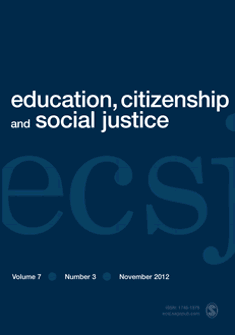
Education Citizenship and Social Justice
Transforming education for a more equitable society.Education Citizenship and Social Justice is a prominent academic journal published by SAGE Publications Inc, dedicated to advancing the discourse around education's role in citizenship and social justice issues. Since its inception in 2006, the journal has provided a critical platform for researchers, educators, and policymakers to explore the intersections of education, citizenship, and equity within diverse societal contexts. With an impressive ranking of #685 out of 1543 in the Social Sciences - Education category and a 2023 Quartile 2 status, it is firmly established as a significant resource in its field. Although the journal does not currently operate with an open access model, its impact on the education sector remains profound, offering valuable insights that contribute to the development of inclusive educational practices. Researchers and students alike will find the journal's rigor and commitment to social justice principles vital as they navigate the evolving landscape of educational research and policy.

Cultural Studies of Science Education
Fostering Collaboration in Science Education through Cultural StudiesCultural Studies of Science Education, published by Springer, is a leading journal in the field of cultural studies, with a specific focus on the intersection of science education and cultural analysis. With an ISSN of 1871-1502 and an E-ISSN of 1871-1510, this journal has demonstrated its commitment to high-quality research, evidenced by its impressive Q1 ranking in 2023 within the Cultural Studies category and a notable position in the 93rd percentile in Scopus Ranks for Social Sciences. Covering a wide array of interdisciplinary topics, the journal seeks to advance the understanding of how scientific knowledge and education are shaped by cultural contexts, making it a vital resource for researchers, educators, and policy makers. Operating from the Netherlands, the journal embraces an open access philosophy to ensure that cutting-edge research is accessible to all, fostering collaboration and innovation in the field. As we converge years from 2006 to 2024, Cultural Studies of Science Education continues to explore critical issues and innovative methodologies, aiming to inspire and inform the next generation of scholars and practitioners.

AUSTRALIAN EDUCATIONAL RESEARCHER
Exploring Critical Issues in Education for Lasting ReformAustralian Educational Researcher, an esteemed publication within the field of education, is published by Springer and serves as a vital platform for the dissemination of high-quality research in educational practice and policy. With an impressive Q1 ranking in the 2023 category of Education and a remarkable Scopus rank placing it in the top 20% of its field, this journal provides a prestigious venue for scholars aiming to influence educational outcomes and reforms. Spanning over three decades, from 1985 to 1996 and then again from 2003 to 2024, the journal features a diverse array of research articles that tackle critical issues in education, catering to a wide audience of researchers, educators, and policymakers. Potential contributors and readers will appreciate its commitment to advancing knowledge and improving educational practices, further fostering a community dedicated to educational excellence.
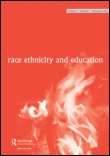
Race Ethnicity and Education
Innovating educational practices for a just future.Race Ethnicity and Education is a premier interdisciplinary journal published by Routledge Journals, Taylor & Francis Ltd, dedicated to exploring critical issues at the intersection of race, ethnicity, and educational practices. With an impressive impact factor and distinguished Scopus rankings placing it in the top quartile across categories such as Cultural Studies, Demography, and Education, this journal provides a rich platform for innovative research that addresses the complexities of educational equity and social justice. Since its inception in 1998, the journal has aimed to advance knowledge in these crucial areas, facilitating scholarly dialogue among researchers, educators, and policy makers. With a commitment to disseminating high-quality research, Race Ethnicity and Education plays an essential role in shaping the future of educational discourse, making it a must-read for anyone invested in the fields of education and social justice.

INTERNATIONAL REVIEW OF EDUCATION
Exploring Innovations in Learning and TeachingINTERNATIONAL REVIEW OF EDUCATION is a premier academic journal published by SpringerNature, recognized for its substantial contributions to the field of education since 1955. With an ISSN of 0020-8566 and an E-ISSN of 1573-0638, it has established itself as an essential platform for interdisciplinary research and discourse. The journal boasts an impressive Q1 ranking in Education and a Q2 ranking in E-learning for 2023, positioning it among the top tier of scholarly publications. According to Scopus, it ranks #224 out of 1543 in the Social Sciences - Education category, corresponding to the 85th percentile, reflecting its influence and relevance in the academic community. The INTERNATIONAL REVIEW OF EDUCATION seeks to advance understanding in both theoretical and practical aspects of education, making it a vital resource for researchers, educators, and policymakers alike. Access to its comprehensive studies and reviews facilitates the continuous development of innovative educational practices, ensuring relevance in a rapidly changing global landscape.
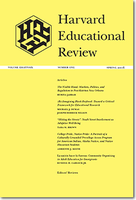
HARVARD EDUCATIONAL REVIEW
Catalyzing Conversations in Educational Theory.HARVARD EDUCATIONAL REVIEW, with an ISSN of 0017-8055 and E-ISSN 1943-5045, is a prestigious journal published by the Harvard Graduate School of Education. Established as a vital platform for the discourse on educational theory and practice, this journal aims to present innovative research and critical analyses that influence the educational landscape. Although it does not currently offer Open Access options, it remains accessible through institutional subscriptions, ensuring a wide reach within both academic and professional communities. With a legacy of scholarly contributions dating back to its converged years from 1979 to 2017, HARVARD EDUCATIONAL REVIEW continues to be an essential resource for researchers, educators, and policy makers dedicated to enhancing educational methodologies and practices. It stands out as a cornerstone in the field of education, promoting dialogue that bridges theory and application.

Power and Education
Illuminating the Nexus of Power and LearningPower and Education, published by SAGE Publications Ltd, is an esteemed journal that explores the intricate relationship between power dynamics and educational practices. With its E-ISSN of 1757-7438, the journal provides an essential platform for scholars and practitioners in the fields of education, sociology, and political science. Since its inception in 2009, the journal has maintained a consistent focus on critical issues in education, aiming to illuminate how structures of power influence educational systems and outcomes. Recognized for its academic rigor, it ranks in the Q3 quartile for Education and Q2 for Sociology and Political Science as of 2023, underscoring its significance in these disciplines. Although the journal does not currently offer open access options, it remains a vital resource for researchers seeking to engage with contemporary debates and research. By bridging theory and practice, Power and Education plays a crucial role in advancing our understanding of the power dynamics that shape educational landscapes, making it a must-read for those committed to fostering equitable educational practices.
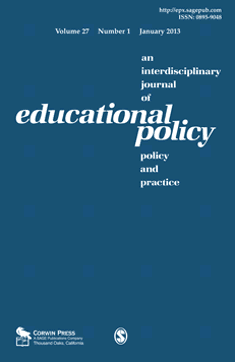
EDUCATIONAL POLICY
Transforming Insights into Educational ActionEDUCATIONAL POLICY, published by SAGE Publications Inc, is a premier journal dedicated to the analysis and discussion of educational policies and their implications within the education sector. With an ISSN of 0895-9048 and an E-ISSN of 1552-3896, this influential journal has been at the forefront of research since its inception in 1987, continuing to provide valuable insights through 2024 and beyond. Ranked in the top quartile (Q1) in the field of Education, as well as achieving a notable Scopus rank of #317 out of 1543 in Social Sciences - Education, EDUCATIONAL POLICY offers a robust platform for researchers, professionals, and students focused on the evolving landscape of educational governance, policy-making, and reform. The journal's commitment to rigorous scholarship ensures that it remains an essential resource for those seeking to understand the complexities of educational systems, making it an indispensable asset for anyone invested in enhancing educational outcomes.